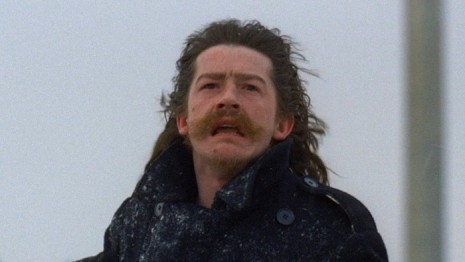
A “lost” film produced from “top to bottom” by George Harrison, has been rediscovered and released on DVD by the British Film Institute. Little Malcolm was made in 1973, and starred John Hurt, David Warner, John McEnery, Raymond Platt and Rosalind Ayres. Based on the play Little Malcolm and His Struggle Against the Eunuchs by David Halliwell, it was Harrison’s first film as producer, and one that was thought long lost, as director by Stuart Cooper explained in an interview with the Guardian:
“George never said this to me,” says Cooper, “but I definitely got the feeling that Little Malcolm may have been the first and last time George ever went to a play. But he was a big, big fan of it and also a big fan of [its star] Johnny Hurt, so he was in our corner already. Also, at the time, the other Beatles all had a film gig, John had done Imagine, Paul, I guess, directed Magical Mystery Tour, and Ringo was in Candy and The Magic Christian. So the only one without a film gig was George. He financed Malcolm through a company called Suba Films, which existed solely to receive profits from the animated Yellow Submarine. It was financed entirely by Yellow Submarine! It wasn’t a big budget, somewhere around a million, million and a half pounds – not expensive. He financed it top to bottom. He stepped up, wrote the cheque, and we made the movie.”
Little Malcolm is the story of Malcolm Scrawdyke (Hurt), a delusional Hitlerite revolutionary, who plots his revenge after his expulsion form college, by forming the Party of Dynamic Erection, with fellow slackers, Wick (McEnery), Irwin (Platt) and Nipple (Warner). Malcolm’s battle is against an unseen enemy, and the film is a mix of Young Adolf meets Baader-Meinhof via Billy Liar.
Halliwell wrote Little Malcolm in 1965, it was his first and most successful play. Directed by Mike Leigh, the role of Malcolm was originally played by Halliwell, who explained his thoughts behind the drama at the time:
“The Nazis made a big impression on people of my age, they almost destroyed Europe. But as well as being pretty threatening they were also seen as a laughing stock even during the war.”
The play’s director, Mike Leigh had a different view of Halliwell and the production, as he wrote for Halliwell’s obituary in 2006:
David Halliwell was a loner. He lived alone and, typically, it seems he died alone. Indeed, his eponymous loner, Little Malcolm Scrawdyke, was in many ways a self-portrait, although David always denied this. Having met at Rada and become close friends, he and I founded Dramagraph with Philip Martin in 1965, and I directed and designed our original production of Little Malcolm at Unity Theatre. David played Scrawdyke. He was impossible to direct, resisted cuts, and the production was famously overlong and unwieldy. But it was and remains a magnificent piece of writing, and it is truly tragic that this quite brilliant and original dramatist procrastinated for the remaining 40 years of his life.
Halliwell didn’t really procrastinate, he was a prolific writer, who, as Michael Billington also pointed out:
...pioneered the idea of lunchtime theatre and multi-viewpoint drama and left his mark on several close collaborators, including Mike Leigh.
Unfortunately, through his determination to do things his way, Halliwell never fully developed his ideas, and as Billington noted, “Halliwell suffered the fate of the pioneer whose ideas are refined and improved by later practitioners”.
Originally Little Malcolm ran for 6 hours, but after subbing by Leigh, it transferred to London’s West End, where John Hurt took over the title role - it was a career defining performance - one of many in Hurt’s case - and after a short run, moved to Dublin and New York. The play won Halliwell a Most Promising Newcomer Award, and also attracted Harrison’s interest, enough for the Beatle to bank roll the movie. But once made, the film was caught up in The Beatles’ acrimonious split, as Cooper explained:
“In the end, we got hung up by the Beatles’ breakup, when all of the Apple and Beatles assets went into the official receiver’s hands. So Little Malcolm just basically sat there for a couple of years. Whatever heat and buzz we generated was all lost. It didn’t diminish the movie but it stopped the momentum. George had to fight to get it back.
“Berlin was the first airing we managed, but it won best direction and the response was incredible. We got great reviews from Alexander Walker and Margaret Hinxman, but by then it really didn’t have any legs. It was a film that got lost, and I had to put it on a shelf and say to myself, well, there might be a day for that one day – and here we are now, after so many years.”
In 1974, Little Malcolm won the Silver Bear at Berlin Film festival. It was Cooper’s first, he won a second in 1975 with Overlord before directing Hurt, Warner and Donald Sutherland in the film version of Derek Marlowe‘s The Disappearance in 1977.
Harrison was certainly an innovator as Little Malcolm and his later movies Monty Python’s Life of Brian, and The Long Good Friday proved. Now, nearly forty years after its first screening, Harrison’s “lost” first film as producer is available at last.





